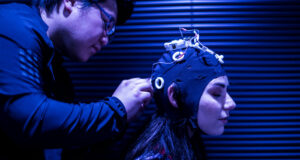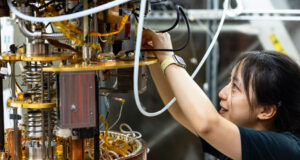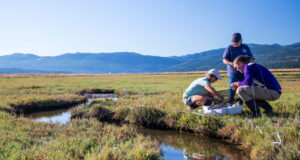Interdisciplinary collaboration is part of the UW research culture. Small research teams and large research centers alike include members from different departments, schools and colleges. Broad areas of the UW’s research strength involve multiple interdisciplinary research centers, for which cutting-edge research is supported and connected by state-of-the-art, cross-campus facilities and multi-disciplinary education programs.
Interdisciplinary Impact: Bothell’s School of STEM & the Information School measure bias in generative AI
Afra Mashhadi, assistant professor in UW Bothell’s School of STEM, collaborates with Chirag Shah, professor at the Information School, and a team of student researchers to evaluate bias and accuracy in generative AI systems.
Interdisciplinary research highlights

Artificial intelligence
A nationally recognized Artificial Intelligence (AI) research hub, the UW has a rich history of contributions to AI, with strong research communities in a wide variety of core AI areas, including machine learning, natural language processing, vision, robotics and intelligent user interfaces. More recently, the UW’s efforts have expanded as AI has become a valuable tool for discovery and innovation across virtually all academic disciplines. UW researchers are using AI to uncover the underpinning mechanisms of diseases, explore the structure and multifaceted functions of the human brain, assess the impacts of climate on the global water cycle, unveil the functionalities of nanomaterials, improve learning outcomes in K-12 education and much more. UW researchers are at the forefront of devising and evaluating AI methods, as well as novel implementations that drive down energy costs. Innovations in domains that apply AI motivate advances in AI methods, which in turn drive further application advances. Researchers studying the impacts of AI on society drive innovations in responsible AI, which inform policy and questions to explore in further social impact research. The UW is either leading or significantly involved in many centers and institutes that focus on AI and Machine Learning (ML). Located in one of the nation’s tech hubs, collaborations naturally extend to industry, including the Allen Institute for Artificial Intelligence.
A sampling of centers at UW working in artificial intelligence:
- AI@eScience.
- Institute for Foundations of Data Science (IFDS)
- Institute for Foundations of Machine Learning (IFML)
- AI Institute in Dynamic Systems
- Accelerated AI Algorithms for Data-Driven Discovery (A3D3)
- Responsibility in AI Systems & Experiences (RAISE)
- UW Amazon Science Hub
- AI Institute for Agent-based Cyber Threat Intelligence and Operation (ACTION)

Neuroscience
Neuroscience at UW encompasses a broad array of research topics aimed at accelerating progress in the fundamental understanding of how the brain and neural systems work, and apply this knowledge to develop interventions for disease, disability, injury, trauma, pain, addiction and mental health. UW researchers are leaders in basic, translational and clinical research using innovative imaging and signaling methods to uncover key neural mechanisms and functions including sensation, perception, cognition, learning, memory, motor control, sensorimotor integration, communication and decision-making. The discoveries inform development of novel imaging modalities, diagnostics, therapeutics, mathematical and computational models, next-generation brain/machine interfaces, development of innovative neural devices and methods for directing engineered neuroplasticity in the brain and spinal cord. This interdisciplinary research is supported by a number of centers and institutes.
A sampling of centers at UW working in neuroscience:
- UW Computational Neuroscience Center (UW-CNC)
- Center for Neurotechnology (CNT)
- Center for Integrative Neuroscience (CIN)
- Alzheimer’s Disease Research Center (ADRC)
- UW Center of Excellence in Neurobiology of Addiction, Pain and Emotion (UW-NAPE)
- Institute on Human Development and Disability (IHDD)
- Institute for Learning and Brain Sciences (I-LABS)
- Washington National Primate Research Center (WANPRC)

Population Health
Population health is a comprehensive approach to wellness that goes beyond eliminating diseases and injuries to explore the intertwined factors that influence health. The UW is a leader in his field through our Population Health Initiative, focusing on human health, environmental resilience, and social and economic equity. The Population Health initiative is broad, involving contributions from all the university’s schools, colleges, and external partners to accelerate impactful solutions. Central to this effort is the Hans Rosling Center for Population Health, a hub for multidisciplinary work that advances the UW’s vision for healthier populations by addressing critical global issues such as poverty, equity, healthcare access, and climate change.
Read more about centers at the UW working in Population Health

Quantum Science
Quantum science explores the fundamental principles that govern the smallest particles and forces in the universe, where classical physics no longer applies. This field seeks to understand and leverage quantum phenomena to drive technological innovation. At the UW, Quantum Information Science and Engineering (QISE) is an interdisciplinary endeavor, merging expertise from Physics, Chemistry, Chemical Engineering, Electrical & Computer Engineering, Computer Science & Engineering and Materials Science & Engineering. The UW boasts an internationally recognized quantum research community, excelling in quantum sensing, quantum computing, quantum communication, quantum encryption and quantum materials. In addition to supporting cutting-edge research in multiple centers and institute, the QISE community collaborates in their nationally-leading workforce development program.
A sampling of centers at UW working in quantum science:

Climate Science
UW faculty are engaged in climate science research across all three campuses. These include the fundamental geophysical processes of climate science, as well as the adaptation and mitigation processes associated with climate change around the globe. UW researchers are leaders in geophysical climate models, ecosystem responses to climate change, the modeling of current and future human population vulnerabilities to climate change and associated natural disasters, and mitigation efforts to reduce carbon in the atmosphere. Research projects range in size from small studies involving individual scientists to large national and international programs involving teams of scientists. This cutting-edge research is supported by several centers that, together, support discovery and practical applications for a sustainable, climate resilient world.
A sampling of centers at the UW working in climate science:
- Cooperative Institute for Climate, Ocean, and Ecosystem Studies
- the Climate Impacts Group
- Program on Climate Change
- EarthLab
- Center for Health and the Global Environment
- Center for Studies in Demography & Ecology
- Center for Disaster Resilient Communities
- Puget Sound Institute
- Clean Energy Institute
- Center for Environmental Politics